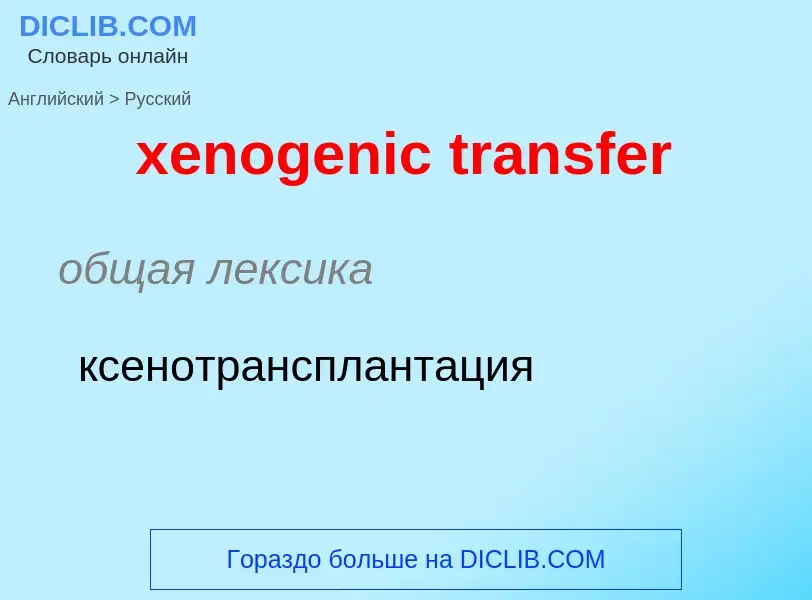Vertaling en analyse van woorden door kunstmatige intelligentie ChatGPT
Op deze pagina kunt u een gedetailleerde analyse krijgen van een woord of zin, geproduceerd met behulp van de beste kunstmatige intelligentietechnologie tot nu toe:
- hoe het woord wordt gebruikt
- gebruiksfrequentie
- het wordt vaker gebruikt in mondelinge of schriftelijke toespraken
- opties voor woordvertaling
- Gebruiksvoorbeelden (meerdere zinnen met vertaling)
- etymologie
xenogenic transfer - vertaling naar russisch
общая лексика
ксенотрансплантация
[tek'nɔlədʒitrænsfə:]
общая лексика
передача технологии (из военных в мирные отрасли, из развитых в развивающиеся страны и т. п.)
нефтегазовая промышленность
передача технологии (процесс распространения научно-технических знаний; практическое использование научных знаний, полученных в другой организации; переход от фундаментальных знаний к техническим средствам; приспособление существующей техники к новому использованию)
Definitie
Wikipedia
A xenobiotic is a chemical substance found within an organism that is not naturally produced or expected to be present within the organism. It can also cover substances that are present in much higher concentrations than are usual. Natural compounds can also become xenobiotics if they are taken up by another organism, such as the uptake of natural human hormones by fish found downstream of sewage treatment plant outfalls, or the chemical defenses produced by some organisms as protection against predators.
The term xenobiotics, however, is very often used in the context of pollutants such as dioxins and polychlorinated biphenyls and their effect on the biota, because xenobiotics are understood as substances foreign to an entire biological system, i.e. artificial substances, which did not exist in nature before their synthesis by humans. The term xenobiotic is derived from the Greek words ξένος (xenos) = foreigner, stranger and βίος (bios) = life, plus the Greek suffix for adjectives -τικός, -ή, -όν (-tikos, -ē, -on).
Xenobiotics may be grouped as carcinogens, drugs, environmental pollutants, food additives, hydrocarbons, and pesticides.


![In 1996, Dutchman [[Edgar Davids]] was the first high-profile player to move on a free transfer via the [[Bosman ruling]]. In 1996, Dutchman [[Edgar Davids]] was the first high-profile player to move on a free transfer via the [[Bosman ruling]].](https://commons.wikimedia.org/wiki/Special:FilePath/Edgar Davids.jpg?width=200)
![[[John Hartson]] failed medical tests which led to the shelving of three potential transfers in 2000. [[John Hartson]] failed medical tests which led to the shelving of three potential transfers in 2000.](https://commons.wikimedia.org/wiki/Special:FilePath/Hartson, John.jpg?width=200)
![Bayern Munich]] from [[RB Leipzig]] for a world record-breaking fee of €25 Million in 2021. Bayern Munich]] from [[RB Leipzig]] for a world record-breaking fee of €25 Million in 2021.](https://commons.wikimedia.org/wiki/Special:FilePath/Julian Nagelsmann 2020.jpg?width=200)
![[[Neymar]] (right) and [[Kylian Mbappé]] (left) are the two most expensive association football transfers. [[Neymar]] (right) and [[Kylian Mbappé]] (left) are the two most expensive association football transfers.](https://commons.wikimedia.org/wiki/Special:FilePath/Mbappe Messi Neymar.jpg?width=200)
![Barcelona]] in 2013 became the subject of investigation. Barcelona]] in 2013 became the subject of investigation.](https://commons.wikimedia.org/wiki/Special:FilePath/Neymar Barcelona presentation 1.jpg?width=200)

![[[Zinedine Zidane]] was the most expensive player in the world for eight years. [[Zinedine Zidane]] was the most expensive player in the world for eight years.](https://commons.wikimedia.org/wiki/Special:FilePath/Zidane Zizu.jpg?width=200)
